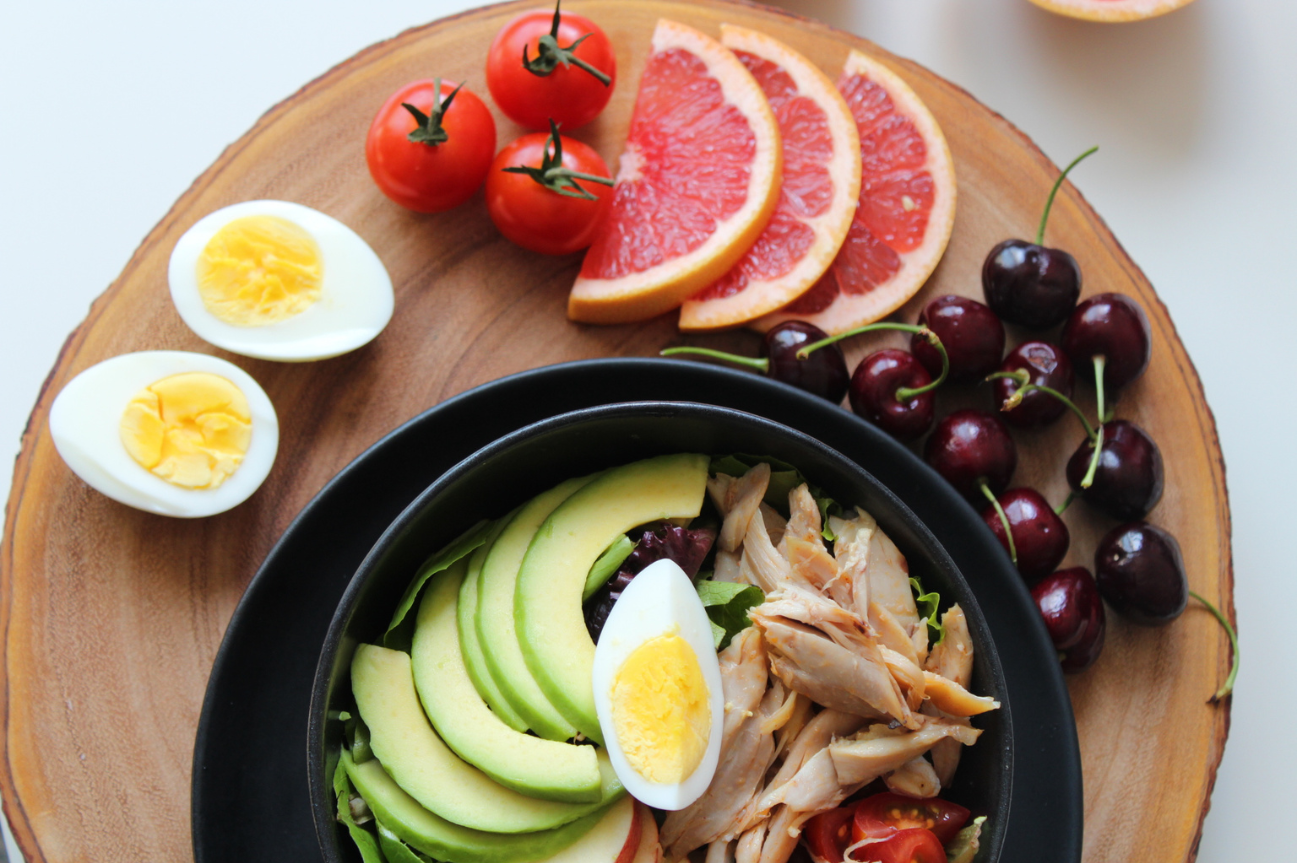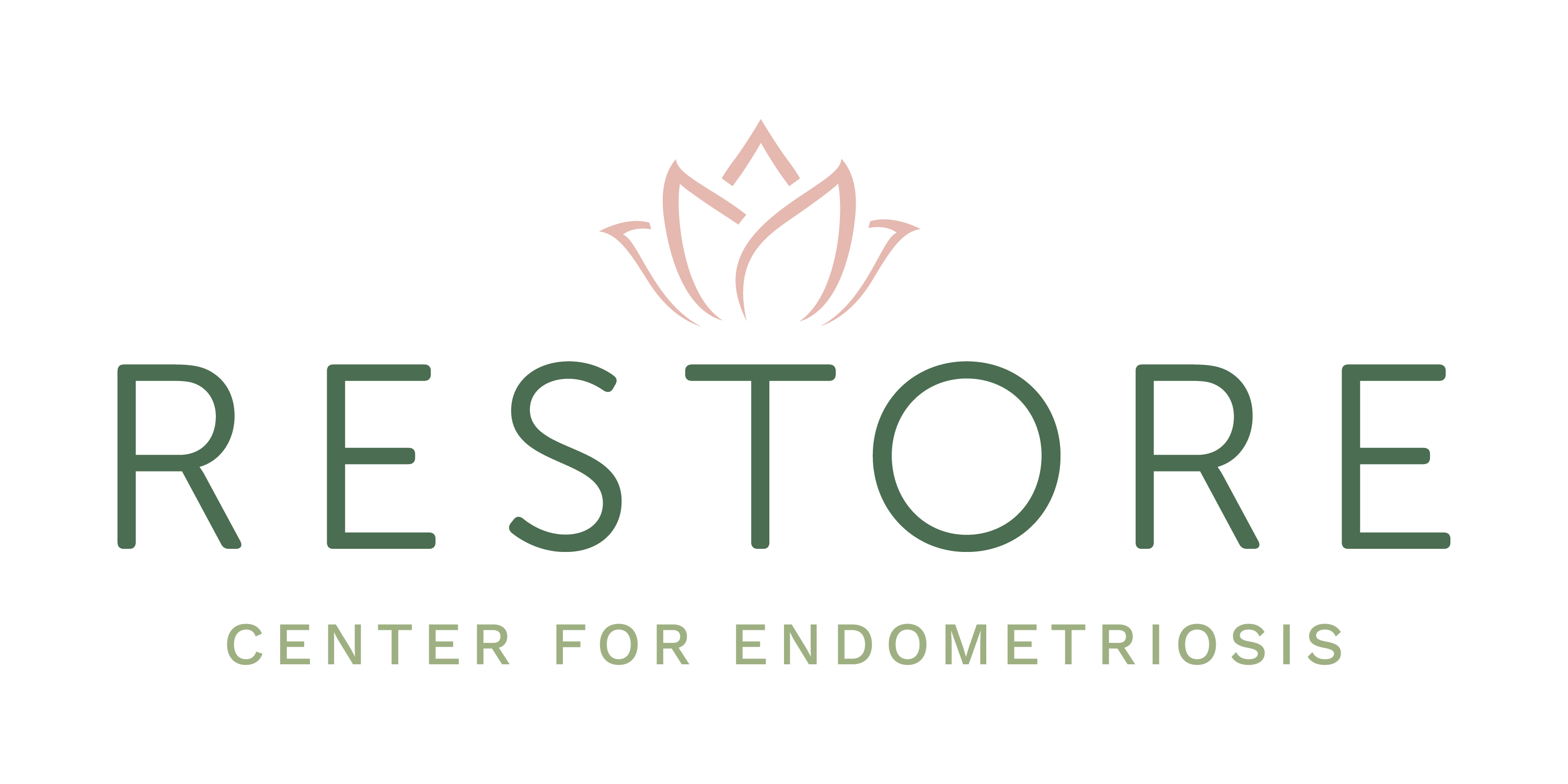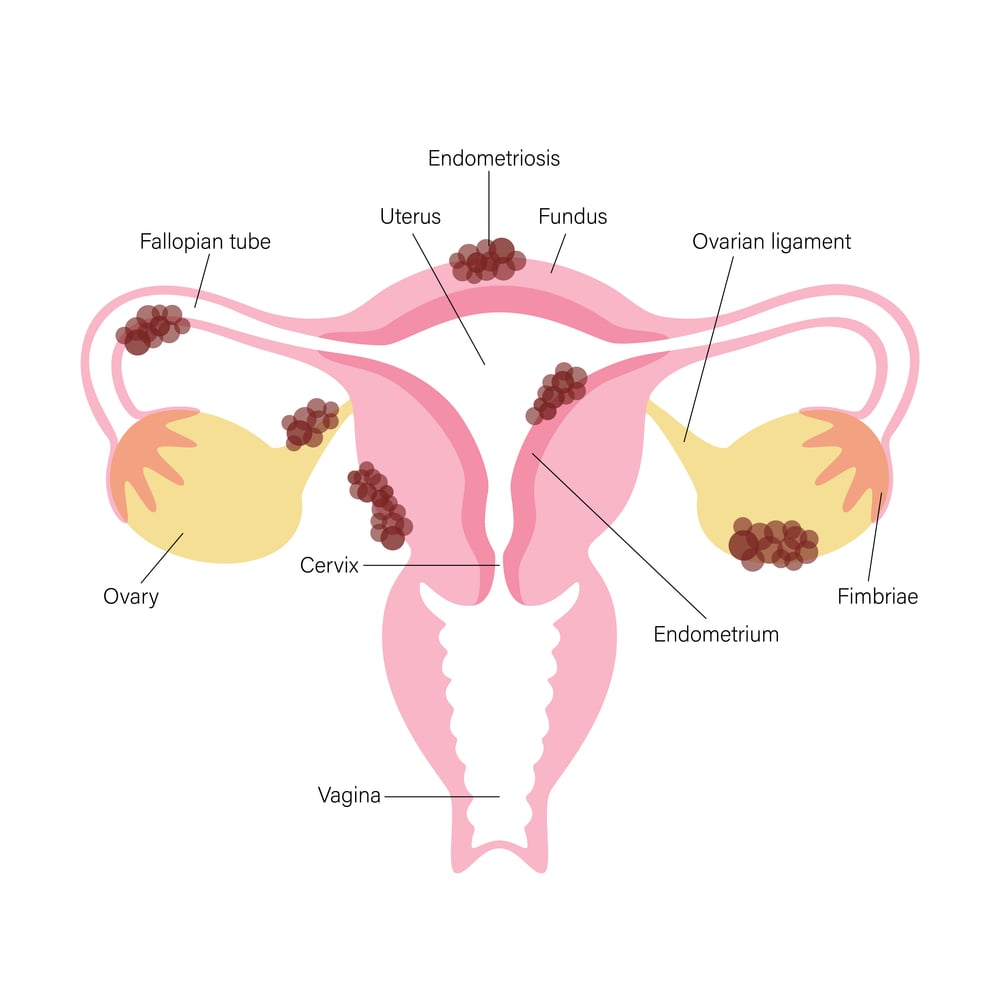5 min read
Anti-Inflammatory Nutrition for Endometriosis
Restore Center For Endometriosis April 28, 2025

How often do we search for the perfect diet, remedy, or hack only to become confused, overwhelmed, and misled?
As endometriosis and infertility patients, it is rare for anyone to understand our chronic pain, constant fatigue, and emotional drain, let alone for us to find reputable resources for supporting our bodies in healing.
That’s where your RESTORE Center for Endometriosis team comes in!
Our root-cause, Functional Medicine approach to healing puts you in the driver’s seat! We understand using food as medicine alongside optimal excision surgery for endometriosis empowers our patients to finally take control of their health!
DOWNLOAD OUR FREE FUNCTIONAL MEDICINE GUIDE TODAY
Dr. Yeung and your RESTORE team understand that endometriosis is an inflammatory condition—typically, the higher our inflammation the more severe our endometriosis symptoms. Inflammation also drives hormone imbalance which means that inflammation and infertility are deeply connected.
This can be a vicious cycle for many women. Constant over-exposure to toxins, particularly, xenoestrogens (synterhetic estrogen-like compounds found in plastics, fragrances, makeup, pesticides, candles, air fresheners, laundry detergents, soaps, and more) drive inflammation + hormone imbalances while inflammation + hormone imbalances drive endometriosis.
When we are chronically inflamed, especially as women living with endometriosis, we are more likely to experience symptoms of hormone imbalance including:
- Heavy, painful, and/or irregular periods
- Infertility or recurrent loss
- Chronic pain including pelvic pain, migraines, muscle + joint pain, body aches
- GI challenges-constipation (we should be having at least 1 bowel movement a day!), diarrhea, gas, bloating, IBS, acid reflux
- Salt and/or sugar cravings
- Chronic stress, fatigue, insomnia, and/or feeling wired but tired
- Mental health challenges-mood swings, anxiety, depression, brain fog
- Blood sugar imbalances/crashes throughout the day and night
- Unexplained weight gain or loss
- Night sweats, excessive swearing, cold hands/feet, and/or the inability to regulate your body temperature
- Skin challenges, brittle nails, and/or hair loss
- Lacking libido and/or pain with intercourse
- Poor immune health/constantly being sick
- Histamine challenges-may look like chronic sinus infections. Can include congestion, rashes/hives, migraines, panic-attacks, heart palpitations, and GI issues
- + many other challenges that are often dismissed or misdiagnosed!
Let’s dive into what living an anti-inflammatory lifestyle looks like and the simple actions you can take each day to feel more in control of your endometriosis and fertility journey!
An Anti-Inflammatory Diet:
It turns out an anti-inflammatory diet is not a diet at all! Rather than counting calories and depriving ourselves, which drive disordered eating and can fuel hormonal imbalance, we:
- focus on whole, nutrient dense, antioxidant-rich foods
- limit processed foods, caffeine, and alcohol
- stay hydrated to support detoxification and hormone balance
- understand your cycle + practice seed cycling
While endometriosis excision surgery is often key to restoring health and fertility, nutritional changes can make a powerful difference in reducing pain, fatigue, bloating, and inflammation.
Support your body with delicious foods—no fad diets or perfection needed, just sustainable nourishment and self-care.
Antioxidant Foods:
These are considered your body’s defenders! These foods help to protect against cellular damage, reduce inflammation, support fertility, prevent chronic disease, boost skin health, support immune function, and boost detoxification!
Eat These!
- Colorful fruits and veggies-apples, berries, beets, bell peppers, carrots, kale, lemons, limes, oranges, pomegranates, spinach, tomatoes, and sweet potatoes
- Cinnamon, dark chocolate, garlic, ginger, green tea, sunflower seeds, turmeric with black pepper, and walnuts
Fiber Foods:
Regulate estrogen balance by moving excess estrogen out, bind to toxins and support detoxification, lower cholesterol + protect heart, promote gut health, support healthy metabolism, balance blood sugar, support healthy weight, and promote healthy bowel movements!
Eat These!
- Almonds, apples, avocado, black beans, Brussels sprouts, cauliflower, chia seeds, chickpeas, colorful rice, flaxseed, gluten free oats, hempseed, leafy greens (spinach, kale, collards, chard), pears, psyllium husk, quinoa, and zucchini
Omega-3 Fatty Acids AKA Healthy Fats:
Our bodies need fat to survive! Healthy fats are crucial in the production of hormones, powerful in reducing inflammation, support heart health, and promote the ability for our brains to send communication throughout the body-a crucial step for regular cycles and fertility.
Eat These!
- Almond milk, anchovies, avocados/avocado oil, chia seeds, coconut/coconut milk/coconut oil, grass-fed butter/ghee, hazelnuts, macadamia nuts, nut butters (almond, sunflower, chia), olives/olive oil, salmon, sardines, and tuna
Quality Protein:
Like fat, protein is essential in hormone production and balance. Protein supports energy production, muscle mass, tissue repair, reproductive health, thyroid function, and blood sugar regulation.
Eat These!
- Organic, grass-fed meats and eggs, fish, nuts + seeds, plant-based yogurts, and plant-based protein powders
Hydrating Foods:
Getting at least ½ your weight in ounces of water each day is critical in detoxification, reducing inflammation, and supporting hormone balance. The good news is plenty of foods boost hydration!
Eat These!
- Bone broth, cantaloupe, celery, citrus, cucumber, peaches, pineapple, strawberries, watermelon, and zucchini
BONUS TIP! Coconut water is the best way to boost electrolyte balance!
A few of our favorite resources for easy anti-inflammatory meal inspirations:
Each of these sights contain thoughtful resources + easy-to-follow recipes and focus on delicious, gluten-free, anti-inflammatory meals.
Understanding Foods to Limit and Avoid:
While following an anti-inflammatory diet can help manage endometriosis symptoms and support hormonal balance, it's equally important to be mindful of foods that can trigger inflammation, disrupt hormone balance, or exacerbate symptoms.
- Processed/pre-packaged foods and frozen meals are filled with chemicals that our bodies do not understand how to break down. These foods damage the lining of our intestines-getting into our bloodstream and fueling inflammation. If it comes in a box or wrapper, it’s best to read the ingredients (if you can’t pronounce most of them leave it behind!) and limit things like cereal, chips, cookies, conventional bread, most granola + protein bars
- Any drinks in plastic bottles as plastic is a xenoestrogen and fuels estrogen dominance
- Soda, energy drinks, Gatorade, and other drinks with added sugar cause blood sugar imbalance, disrupt overall hormone balance, and led to poor sleep
- Fast foods expose us to low-quality ingredients, highly processed seed oils, and often have no nutritional value
- Conventional dairy is filled with synthetic hormones, antibiotics, and chemicals, which the cows are exposed through to poor-quality feed, all of which fuel hormone imbalance and inflammation
- Gluten is highly inflammatory, fuels leaky gut (the breakdown of our intestinal lining), and triggers immune system dysfunction. Modern wheat is highly processed and sprayed with pesticides which drive chronic disease
- Alcohol increases estrogen while disrupting blood sugar balance, sleep, liver function, and detoxification. If consuming alcohol opt for clear liquors (think vodka + club soda + lime) or red wine
- Caffeine is a stressor and stimulant, essentially sending signals to the body that we want more stress! Opt for black coffee or green tea, if tolerated
BONUS TIP! These foods are being created to be addictive! If you are struggling breaking poor food habits it is not your fault. These foods are engineered to trigger pleasure responses in our brains and keep us addicted. Start with small, sustainable changes and make healthy swaps!
Healthy Swaps:
| Chips | → | Veggies chips-kale, sweet potato, zucchini |
| Conventional Dairy | → | Organic, grass-fed dairy (when tolerable) or nut milks |
| Coffee | → | Green Tea |
| Desserts | → | Homemade GF cookies, dark chocolate, fat bombs |
| Dips | → | Guac, Hummus, Tahini |
| Flour | → | Almond flour or any GF flour alternative |
| Pasta | → | Spaghetti squash, zucchini noodles |
| Processed Oils | → | Avocado/coconut/olive oils |
| Soda | → | Water/carbonated water (add citrus, herbs, berries!) |
| Sugar | → | Raw, local honey or maple syrup, Stevia, Monk Fruit |
A Day in the Life:
Morning Routine:
~Start each day with 10-15+ minutes of natural sunlight and grounding to support cortisol/melatonin balance and promote calm
~Practice gentle movement/light stretching/yoga with deep breathing
~Drink at least 8oz of warm water to support detox and digestion. Add Himalayan, Celtic, or Redmond salt + lemon for adrenal hormones support
~Enjoy a protein packed breakfast of eggs, chicken sausage, and almond yogurt topped with honey, chia seeds, and berries
Mid Morning:
~Take a few moments away from work/screens/routine, enjoy light stretching or go on a walk
~Sip tea or an adrenal mocktail
Energizing Lunch:
~Enjoy a lunch filled with protein, veggies, and healthy carbs—salads/bowls with protein + avocado + nuts/seeds are easy for on-the-go
~Get some gentle movement, take deep breaths to support digestion and calm
Afternoon:
~Take a 1-5 minute reset, step outside, stretch, journal, or take deep breathes
~Enjoy a fun snack such as a smoothie, fat bombs, or veggies with dip
Dinner:
~Get creative with your favorite veggies + protein
~Add a smoothie or shake for dessert!
Evening Routine:
~Finish meals and snacks at least 2 hours prior to sleep
~Take time for what soothes you—reading, journaling, praying, sipping decaf tea, a warm bath
~Spend time in soft lighting, limit screens, listen to gentle music or meditations
~Wear a castor oil pack to support detox
~Sleep in a cool, dark room with limited technology for at least 7-8 hours
Remember! Small, sustainable changes lead to healing!
Embracing an anti-inflammatory lifestyle empowers you to regain control and restore your life!
We understand that living with endometriosis can feel overwhelming, but you don’t have to navigate this journey alone, your RESTORE Center for Endometriosis team of St. Louis, Missouri is here for you!
Not sure where to start?
Connect with Chelsey, our Functional Medicine Health Coach, for personalized support! WellnesswithChelsey@gmail.com or IG: @wellnesswithchelsey
Related Posts

Do I Need Postoperative Hormonal Suppression?




